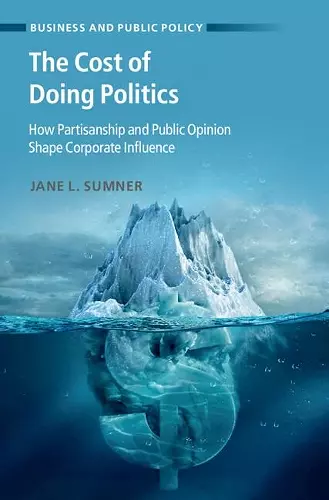The Cost of Doing Politics
How Partisanship and Public Opinion Shape Corporate Influence
Format:Hardback
Publisher:Cambridge University Press
Published:5th May '22
Currently unavailable, and unfortunately no date known when it will be back
This hardback is available in another edition too:
- Paperback£25.99(9781009124584)

Reveals how and why corporate political influence remains largely invisible to the public eye.
Using quantitative and qualitative evidence, Sumner shows that consumer boycotts can work to dissuade companies from donating money to politicians, but may also encourage them to attempt influence by less-visible means. This book is written for scholars and students interested in corporate political influence.Using quantitative and qualitative evidence, Sumner shows how consumer boycotts can work to dissuade companies from donating money to politicians, but may also encourage companies to attempt influence by largely invisible means. Boycotts do not work as many people expect – by threatening sales. Instead, Sumner shows how boycotts are less a statement of consumer behaviour than a way for people to signal their political inclinations, and they primarily hurt companies by tarnishing their reputation. Political influence is about building relationships, which means that companies have many more options for influence than just PAC contributions and formal lobbying. With these options available, companies can decide how to influence politics when they need to, and the tarnish of boycotts to a company's image can push some businesses to pursue options that are less noticeable to the public.
'This book shows how the ever-present 'threat of public backlash' induces firms to obscure some lobbying-type actions aimed at political influence, to avoid some others altogether, and conversely intentionally to publicize a few others or at least undertake them in plain daylight without effort to hide. It convincingly establishes that 'public backlash' against firm political action (influence-seeking) is a form of political speech that strongly influences how, and how much, corporate political influence is exerted. Jane Lawrence Sumner's The Cost of Doing Politics is outstanding, and important, scholarship on the powerful role of popular action in mitigating problematic firm lobbying and government influence.' Robert J. Franzese, Jr, Department of Political Science, The University of Michigan, Ann Arbor
'Businesses want to influence policies, at the local, state and national levels. But they may want to do so discretely, away from the spotlight of consumers or activists. Using interviews, survey experiments, social media data and corporate filings, Sumner explores how U.S. firms choose among influence strategies, such as lobbying, campaign contributions and local philanthropy. In doing so, she offers insights into corporate political activity, corporate social responsibility and consumer activism.' Layna Mosley, Professor, Department of Politics, Princeton University
'Sumner's rigorous yet readable book makes two innovative claims: businesses pursue their interests at all levels of governments-local as well as state and federal-and they often avoid regulated campaign and lobbying spending precisely because it's easily seen and thus a potential source of public backlash. A major contribution to the study of corporate power.' Jacob Hacker, Stanley B. Resor Professor of Political Science, Yale University
'… excellent for collections on American politics and government-business relations … Recommended.' D. Schultz, Choice
ISBN: 9781009123259
Dimensions: 235mm x 157mm x 17mm
Weight: 520g
260 pages